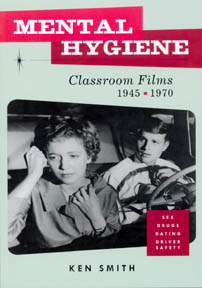Ten years ago, while working at Comedy Central, then know simply as the comedy station, the author Ken Smith discovered one of the last unexplored vestiges of American popular culture: the classroom film – those 16 mm movies like Duck and Cover, Seduction of Innocence and Body Care and Grooming, that were designed specifically to shape students’ behavior. “My job was to cut these classroom films into 30 second-snippets for the station,” Smith said last week. “The more I started watching the films, the more I became fascinated. So I asked around, and nobody knew anything about them, which made me even more curious. Thousands of these films were made. It was mind-boggling.” Faced with a dearth of information, Smith set out to do some research. He interviewed actors and directors, compiled filmographies and catalogued over 300 films. The result: Mental Hygiene: Classroom Films 1945-1970, is the first in-depth look at these unintentionally hilarious and often forgotten classroom films. And on Tuesday, Feb. 22, at 8 p.m. Smith will share his knowledge and some of his favorite films at Maxwell’s (1039 Washington St.) in Hoboken. “They are all forgotten now, and are seen as an embarrassment to the educational system,” said Smith. “But they represent a fascinating range of style and compositions. They are not all alike, and it’s interesting what they reveal about society, then and now.” He added, “For the most part, the films are extremely dogmatic. The are very black-and-white, there is a right way and a wrong way to do things, according to these films. The theory was that you could teach guidance. So they depict a very narrow code of behavior, with no diversity and no notion of independence, using fear and scare imagery.” Mental Hygiene is Smith’s fifth book. He is also the author of Ken’s Guide to the Bible, Raw Deal: Horrible and Ironic Stories of Forgotten Americans and the co-author of two Roadside America guidebooks. “I’ve made a career out of putting my nose into things that other people have avoided,” he said. Fortunately, Smith’s curiosity about classroom films peaked just in time. “Most of the filmmakers are in their 80s,” he said. “A lot of them are dead. I’m lucky I got to them when I did.” Smith is particularly fond of the director Sid Davis. Davis, who started his career in Hollywood as a stand-in for John Wayne, examined the darker side of human behavior. Released in 1950, his first film, The Dangerous Stranger, dealt with child molestation. When the movie received rave reviews, Davis went on to make over 150 more classroom films, all about – in Smith’s words – “youthful miseries.” “For some of the directors, it was just a job that they enjoyed,” he said. “But some of the directors were more ideologues, like Sid Davis. He was not a cynic; he was very earnest.” Not all classroom films dealt with such dark themes. The 1949 film, Dating: Dos and Don’ts, is among Smith’s favorites. “You go through a first date of Woody, a rolly-polly teenager,” said Smith. “Woody takes Anne to the hi-teen carnival and they eat hot dogs and cotton candy. And at key moments, the action stops and a narrator presents Woody with several options for his behavior.” Smith grew excited as he discussed the film’s end, “How do you say goodnight?” “At the end of the night Woody lunges at Anne. And then the narrator interjects and says, ‘that’s not the way to do it.’ And so Woody shakes her hand instead.” Smith seemed pleased. “For years, these films have just been considered camp and kitsch,” he said. “But there is so much more to them. They’re educational as well as entertaining.”
Author Ken Smith brings classroom films to Maxwell’s
